No Hype Necessary
Rafael Major
February 1, 2005

It has become fashionable for people to complain about the transparent “hype” that accompanies the Super Bowl. These complaints are justified when we consider that pre-game shows for a 6:30 p.m. kick-off begin by 9 a.m. at the latest. But as in all political matters people often lack self understanding—i.e. the people complaining are the same people who are watching.
As I sat there on Super Sunday—obviously over analyzing—Super Bowl hype, I got a lesson of my own. At about 6:15 pm, just after Presidents Bush and Clinton explained their tsunami relief efforts, Thomas Jefferson sat at his desk and began penning, “When in the course of human events…”!!
I am sitting in a local watering hole watching the same Fox Sports broadcast that millions upon millions of people are watching around the world and before I knew it, I was standing two feet from a television screen as a voice began reading the Declaration of Independence. It was less than twenty minutes before kick-off and there I was listening as various sports celebrities and politicians recited—clause by dependent clause—the first paragraph, and then they began reading the second to the crescendo of “Life, Liberty and the pursuit of Happiness.” But there was much more.
I stood there, feeling a genuine rush of excitement, with the realization that they were going to read the entire document. They did omit the list of grievances against the king, but not the observation that our past British brethren were “deaf to the voice of justice and of consanguinity,” nor our direct appeal to the “Supreme Judge of the world for the rectitude of our intentions.” And all of this with the full sobriety that everything was a stake in this dreadful decision. Even with a firm reliance on the Protection of Divine Providence: Lives, Fortunes, and sacred Honor hung in the balance of the events to come.
As the segment concluded and the talking heads came into focus, Greg Gumbel spoke of the power of the video presentation, but more importantly according to him, the power of the Declaration of Independence as the “cornerstone” for everything it means to be an American.
As someone who has occasion to teach the Declaration and other old texts I was struck by two important things. First, by the fact that in the middle of the Super Bowl “hype,” Thomas Jefferson and the signers of the Declaration were somehow behind it all and above it all—that is to say responsible for the American experience in the most fundamental way.
The second thing that struck me, however, relates to real lesson I learned. As I stood there (goose-bumps and all) I wished that my “Understanding Politics” class could see what I just saw—felt what I felt. It is sometimes difficult to get the modern college student to see the importance of understanding what a text like the Declaration really means. It is one thing to tell them of its importance and quite another for them to feel it in their bones.
These students have been told, and told before they remember, that they have the right to seek happiness in their own way. It is like a “pass” issued to them at birth. If they do not confront the Declaration, however, it is a pass seemingly devoid of guidance. If they do not feel the Declaration in their bones, they can have no sense of the responsibility that this same pass entails.
But I am partially to blame. The next time I teach the Declaration, I will avoid the usual hype. I will begin the way America began, with a simple reading of the Declaration of Independence.
Rafael Major is an assistant professor of political science at Ashland University and an adjunct fellow of the Ashbrook Center.

